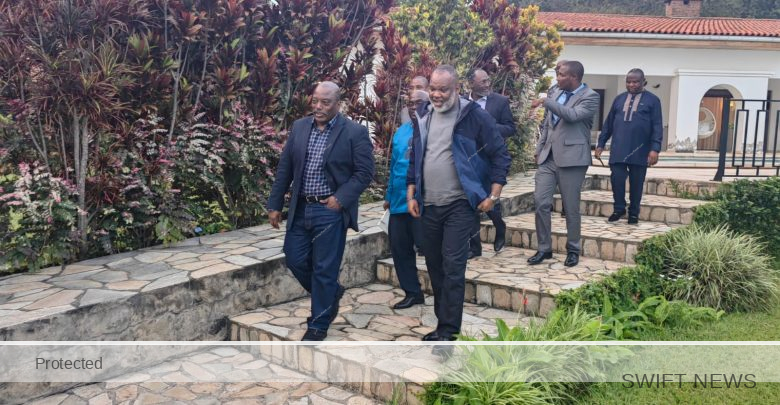
By Our Reporter
In a dramatic escalation of his political comeback, former Congolese President Joseph Kabila held a highly publicized meeting on Friday with leaders of the M23/AFC rebel coalition in Goma, marking his first overt engagement with the armed group that Kinshasa classifies as a terrorist movement.
The meeting, which took place inside M23-controlled territory in eastern Democratic Republic of Congo (DRC), signals a bold shift in Kabila’s posture—from resisting legal pressure to embracing open alignment with insurgent forces. The session was confirmed by Corneille Nangaa, coordinator of the Alliance Fleuve Congo (AFC), who posted photos and a statement on social media platform X.
“It was a very good working session this afternoon at Goma between the coordination of AFC/M23 and the Honorary President Joseph Kabila Kabange,” Nangaa wrote. He described the gathering as the inaugural step in “a series of reflections on how to establish and cement lasting peace, national cohesion, and definitive living together.”
A Calculated Political Gambit
Kabila’s decision to meet face-to-face with M23 commanders, in territory firmly outside government control, is a stark indicator of his evolving political strategy amid intensifying tension with President Félix Tshisekedi’s administration.
The former president is currently facing possible prosecution after the Congolese Senate recently lifted his senatorial immunity following allegations of treason, war crimes, and crimes against humanity—all linked to his suspected support for the M23/AFC. In response, Kabila declared that he would now actively “participate in the liberation of the country.”
By stepping directly into rebel-held zones and engaging the group’s leadership, Kabila appears to be building an alternative power center—one that could complicate ongoing peace efforts mediated by Kinshasa, the African Union, Qatar, and the United States.
“This meeting marks the moment Kabila has officially crossed the political Rubicon,” a senior government source in Kinshasa told local media. “What was previously indirect association is now an open alliance.”
Geopolitical Tensions Mount
Kabila’s political maneuvering is already reverberating across the region. Sources say he initially attempted to access Goma through Uganda, but his entry was blocked by President Yoweri Museveni, who reportedly feared the move would compromise Kampala’s military cooperation with Kinshasa in the fight against the ADF insurgency, and threaten Uganda’s $530 million annual trade with eastern DRC.
Museveni has long harbored doubts about Kabila’s commitment to regional stability, especially due to his previous tolerance of ADF operations on Congolese soil. His son, General Muhoozi Kainerugaba, was more forthright, tweeting: “I will never allow Joseph Kabila to become President of DRC again.”
Despite being denied entry at the Ugandan border, Kabila found alternative routes into Goma, where he is now seen as consolidating ties with the M23/AFC leadership.
A New Phase In Eastern Congo’s Crisis?
Political analysts argue that Kabila’s latest move is not merely a push for peace, but a bid for power-sharing and a seat at the table in any eventual post-conflict arrangement. “This isn’t about peace alone—it’s about negotiating political survival,” said one regional diplomat. “Kabila wants to be part of the new political equation, and he’s leveraging the rebels to do it.”
Within Kinshasa, the government has yet to issue an official statement, but insiders indicate that further legal and diplomatic action is under consideration. Justice Minister Constant Mutamba has previously hinted that Kabila’s assets could be frozen as part of the prosecution effort.
“This is no longer a judicial file,” a senior government official warned. “It’s evolving into an existential challenge to state authority.”
Uncertain Future
With regional diplomacy intensifying and fragile ceasefires already under strain, Kabila’s public alignment with rebel commanders threatens to upend months of careful negotiations. His new self-styled role as a broker for “lasting peace” raises alarms that the conflict in eastern DRC could enter an even more dangerous and destabilizing phase—one where political legitimacy is contested both within Kinshasa and from the parallel structures now forming in rebel-held territories.
As Joseph Kabila re-emerges not just as a political figure but as a strategic force in Congo’s ongoing unrest, the question now confronting the region is not only how peace can be achieved, but who will be allowed to define it.

